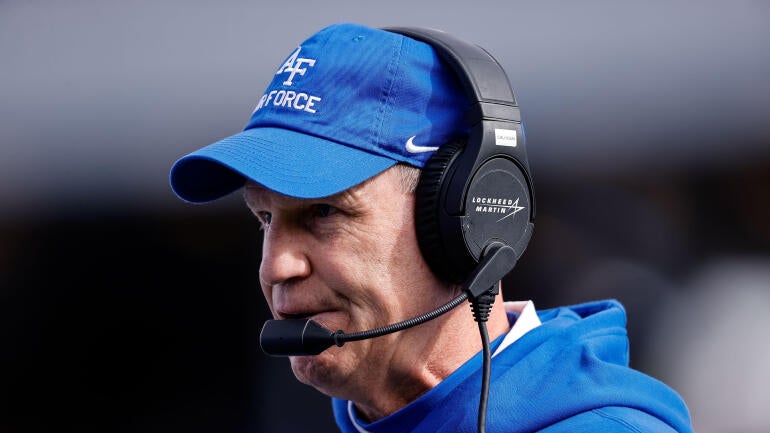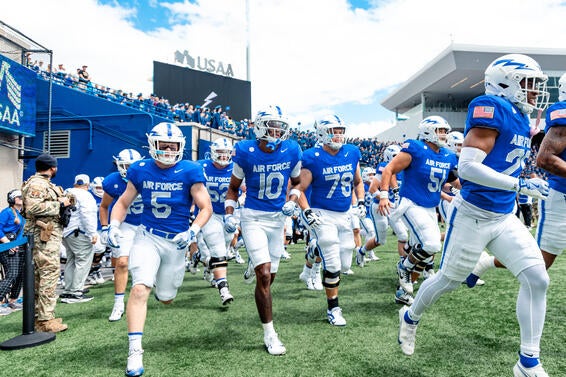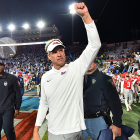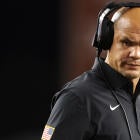
How Air Force navigates college football's modern era with tradition and tenacity in recruiting
A deep dive into what fuels the Falcons and coach Troy Calhoun, whose football program faces more unique challenges than ever before

COLORADO SPRINGS, Colo. -- When Air Force coach Troy Calhoun looks across the field during Saturday's game on CBS Sports Network, he'll see one of college football's two FBS teams that aren't in a conference -- UConn. While the Huskies are hamstrung without a conference, it hasn't hampered their ability to attract players, use NIL or recruit the transfer portal.
Air Force is among three service academies at the FBS level. Army and Navy are both in the American Athletic Conference and on the East Coast. The Falcons, meanwhile, are on an island.
Calhoun's program does have a conference -- the Falcons are original members of the Mountain West, which will look dramatically different in 2026. But what he doesn't have is the ability to recruit the portal or offer ample NIL.
So, how does an FBS program recruit in college football's modern era -- where roster management, NIL and the portal impact just about every program beyond Colorado Springs, Colorado, Annapolis, Maryland, and West Point, New York?
"It all starts, program-wise, with recruiting," Calhoun told CBS Sports. "When you visit a kid and his family, you're going to get asked about NIL. Everyone is going to ask about NIL. That's the age we're in.
"What we offer is much greater than NIL. But that doesn't always sit well with recruits and their families, so we have to prepare for those questions. But it is not a long conversation."
Recruiting spotlight on academics and character
Calhoun instead focuses on the big-picture opportunities that attending the Air Force Academy brings.
"It's a much stronger part of the conversation for us with players," Calhoun said. "When you go to conference meetings, you rarely ever hear academics mentioned in this day and age. But the players we target, we're talking more on what to expect at the academy -- the academic packages, the military obligation, the character, the toughness and the leadership aspect."
More schools eschew the contact period in the fall and winter while they prepare their own teams for games or work to maintain their own roster. Air Force dives right in.
"There is no one that values the contact period more than we do," Calhoun said. "There is a clear distinction between the eval period and the contact period. We're very much involved with the home visits and the school visits.
"There is more to it for us than just seeing them work out. They're going to ask decent questions and everything that we offer as a program."
Portal limitations and developmental challenges
The portal might as well be foreign for Air Force to recruit from, though the Falcons do lose players to it.
"We do not and we have not," Calhoun said.
It's not because he's philosophically opposed to it -- it has more to do with the requirements that are necessary to attend the Air Force Academy.
"It's not that we wouldn't take one out of the portal," Calhoun said. "But you would have to start from the beginning, with basic training. Each player would have to go through basic training.
"We've never taken a transfer since we've been here. Those would be just the start, and most players interested in the portal are looking for a quick transition."
Of course, with a large volume of schools building rosters via the portal, Calhoun tries to navigate that given the difficulty of facing other rosters, especially in knowing an upperclassman could be a difference-maker for the Falcons.
"We don't have fifth-year guys just coming in, so you have stronger bonds," Calhoun said. "You have more transformational relationships. You have to know the window that you have them is pretty short.
"The challenge going forward is how do you match up. We will play 19-year-olds compared to 23-year-olds. Seeing older guys who are 22-23, the bodies are different. That's real.
"We have a good number of guys who are younger, that are 17-18, who, when they were 4-5, they had the whole math aptitude. But while they had the academic aptitude, physically they aren't where a lot of our opponents (are)."
At the same time, his staff tries to maintain its roster yearly and keep players in Colorado Springs.
"The tampering, for sure, that is prevalent," Calhoun said. "We have a guy at a Big Ten school who played as a sophomore for us.
"I'm fully aware that we're playing a good number of freshmen and sophomores who could be attractive to a program, so we realize the tampering part."

Even with the reborn Pac-12 raiding the Mountain West, Air Force is staying put -- whom and how it recruits won't change.
"I don't think the conference piece of it affects us much," Calhoun said. "You can only recruit a kid who has an SAT, a minimum of a 1200. It doesn't matter what conference we're in, we have to recruit academically. There are a good number of schools that are not requiring a test score, including Ivies.
"On the other hand, we want guys to test and test often. The foundational academics are crucial -- we want calculus, we want chemistry and we want physics.
"You also are going to serve after. Moms and dads are aware of what's going on politically. They're astute. Those are things that arise in our recruiting conversations."
Despite being in Mountain time, while fellow service academies are Eastern, Calhoun and his staff recruit nationally.
"Only 10% of our roster is from the Mountain time zone," he said. "Another 10% is from the Pacific and Hawaii. We're 40% Central time zone and 40% Eastern time zone.
"Most of our roster is from east of the continental divide. You look at the major Air Force bases, Hurlburt Field is in Florida. There are main transports in North Carolina.
"You look at the major decisions that are made are in the Pentagon, and then anything in the Middle East is based out of an Air Force base. Most of the football players we recruit are in Texas or the Southeast."
Answering questions about the academy and commitment after football comes up quickly. Most don't have familiarity with the military, but they quickly realize the enormity of the commitment.
"I would bet 90% of our players do not come from a military family," Calhoun said. "It's uncommon. Most before their junior year don't know much about the program, so we're educating them. We align with the Patriot League and the Ivy League in a lot of ways.
"It's not a pool -- it's a tiny puddle you're choosing from. You're looking for the right young person. The testing part (SAT and ACT), you can't take that for granted and the foundational academics before they come here.
"And then the willingness to serve, the commitment that's involved. A young person has to realize if they can do that. The fortitude and the character, knowing you're willing to serve and you're part of something bigger than yourself, the character attributes, those are traits we look for."
It's also why the Air Force doesn't tend to extend early offers while its conference brethren may.
"We tend to wait until January of their junior year to offer," Calhoun said. "We want at least five semesters of a transcript. We want to know when it comes to the math and sciences, we want to know that they can qualify for the academy.
"The pretest, the SAT and the ACT -- the academic part has to be right. And if it's just not going to happen academically -- and, honestly, for the kid's sake -- we want to make sure the kids who we engage with understand that."
Air Force also does not take early enrollees and, since players don't sign a letter of intent or an intent to enroll, they will watch them all the way until the end of their senior seasons. At Air Force, there is still tremendous value in the senior evaluation.
"We can watch their senior film and the senior evaluation matters here," Calhoun said. "You get to watch those first four games. As soon as you see someone who interests you, you have to go to their transcripts -- do they have the minimum language, the pre-calculus, they have to have pre-calc or calculus.
"Boys can mature a little later, and you are playing a more developmental sport. But now you're going off 17-18 instead of 15."
Building -- and retaining -- big classes
Air Force routinely brings in one of college football's largest classes and retains them admirably.
"We would like to bring two-deep at each position, and the reason why is, once you get here, our retention has been very good by and large," Calhoun said. "We've been fortunate enough for the guys who come to the academy. You're working off 3 1/2 years and 40 months, wherein this day and age -- and a ton of guys playing five years and early enroll -- you have schools with guys who've been involved for 55-60 months.
"The 40-month developmental window compared to the 55-58 we may face is big. Our starting point a lot of times is with a younger guy -- they need to get to first grade right away because they're so advanced academically already. You might have guys who are starting college at age 17 and other schools have players that are starting college at 19. That's a major difference, often, for a male."
A legacy of leadership
Even with the self-imposed restrictions that Air Force faces -- the lack of NIL, inability to recruit transfers and lack of early enrollment -- Calhoun couldn't think of a better place to be.
As he wraps his 19th season coaching his alma mater, he is proud of what he has done in replacing his mentor and predecessor, Fisher DeBerry, who led the program for 23 seasons.
"This place is unlike any other in the country," Calhoun said, "and the players we recruit, the young men we coach and develop, they know coming to the Air Force Academy is much bigger than just football.
"We want to win football games, no doubt, but we want to continue to build fine young men."

















